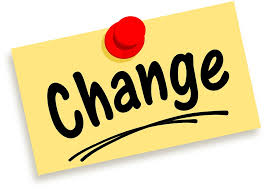Why do we resist change? (Or, do we?)
Why do we resist change?

In this edition of Soul Notes, let’s talk about change. I’m not talking about change for change’s sake. I’m referring to those anticipated or even avoided changes that gnaw at us, and keep us at best distracted or at worst completely stuck, immobile, and hunkering down and ducking from opportunities that may expand us, help us and others, and even allow us fully to flourish.
Rather than resisting or avoiding change, perhaps it’s worth flipping it on its head:
What if instead it was a matter of welcoming and embracing change, in spite of, or even especially when, the outcome is uncertain? It need not be reckless nor done with wanton abandon.
With, in many instances, hotly contested races in the midterm elections held in the United States this week, many voters heartily embraced a change in the ruling political party and a rebalancing of power among the three branches of government. Not everyone held on for dear life to the status quo.
Some changes are certain. They are taken as a given, without resistance: The ebbing and flowing of the tides. The waxing and waning of the moon. The rising and setting of the sun.
Stages and seasons of growth in nature: those are accepted as certain, or nearly always so. Nature takes a certain trajectory, follows a certain course, pattern, cycle, movement, and rhythm. Of all the species, it is humankind that is perhaps the most not-so-kind to the natural world. We are the species that most interferes with the grand design of this world.
It is we who inject and impose contorted calendars and appointment schedules into what is an otherwise orderly order. We invoke what are for the most part arbitrary time changes such as “daylight saving time.” It is this imposing of our will over divine will that I would venture to say brings us strife and grief, and long-term suffering at the hands of fleeting, or even altogether unmaterialized, gains.
Maybe it really does come down to the invocations expressed in the Serenity Prayer: Accept the things we cannot change, change the things we can, and invite in the wisdom to know the difference. For those circumstances we cannot change, we can still indeed change our response. (See The Meaningfulness of Meaning here, referencing the work of Viktor Frankl.)
We are in control. We get to decide how we respond. We get to take inspired action. We get to adapt, move forward, expand, and grow. And why not? To stay stuck is tiring, uninspiring, and altogether dull.
For your consideration:
Is change something to be avoided at all costs? Why or why not? Does it depend on the situation?
Okay, your turn
Where has embracing change, even when initially it seemed scary, brought about improved outcomes for you? On the other hand, when would you have benefited from accepting a situation exactly as-is, and had fully appreciated it in that moment?
I invite you to share your thoughts, feelings, and experiences in the Comments section, below. Soul-to-soul!


Leave a Reply
Want to join the discussion?Feel free to contribute!